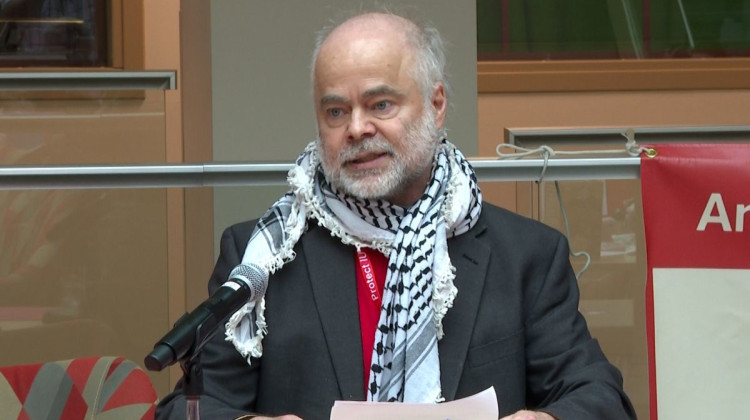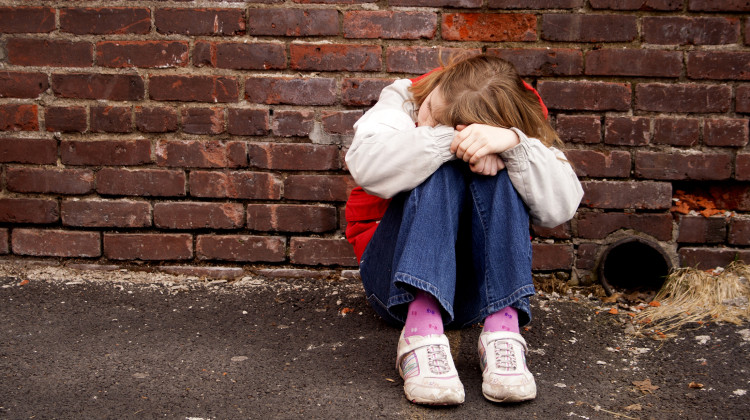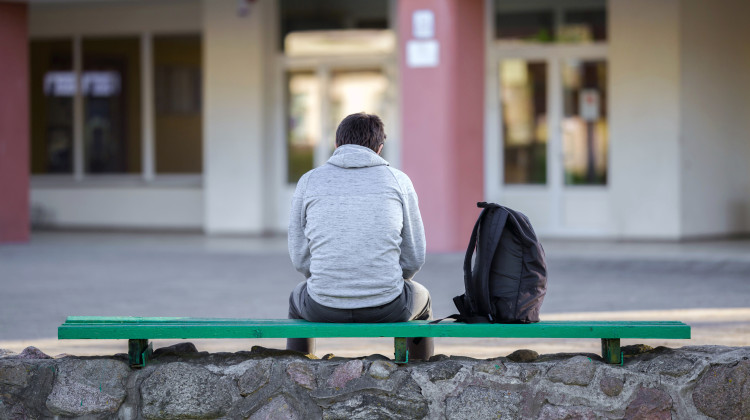
Aaron Munson, who has been in education for over 15 years, noticed more children struggling with anxiety and depression during the pandemic.
(Dylan Peers McCoy/WFYI)As a school counselor, Aaron Munson typically only has a few students each year he needs to assess for suicide risk. But during the pandemic, he has seen more children struggle with suicidal thoughts and self-harm. Last school year, he had to assess five students over just six weeks.
"It is, I would say, a wake up call,” said Munson, who works with elementary and middle school students at Butler Lab at School 55 in Indianapolis Public Schools. “I don't even know who to give the wake up call to but our students are being impacted in such profound ways that I truly don't even think that we will see the ramifications fully for probably another decade."
A 15-year teaching veteran, Munson was recently named 2022 Elementary School Counselor of the Year by the Indiana School Counselor Association.
When Munson was dealing with the increase in suicide risk last school year, he also noticed that most of the students he had to assess identified as LGBTQ. Because of that, he helped start a group for LGBTQ students and allies, known as the Genders & Sexualities Alliance. He also wrote a curriculum to discuss those issues in the small counseling groups he runs at lunchtimes.
The increase in anxiety, depression and suicidal thoughts that Munson has observed are supported by mounting national evidence. In the first months of the coronavirus pandemic, emergency department visits for mental health-related concerns spiked among elementary and middle school age children, according to the Centers for Disease Control and Prevention. More recent data shows visits for attempted suicide dramatially increased among teenage girls. And a survey from 2020 found that about a third of parents believe their child’s mental health is worse than before the pandemic.
"It feels like the building is on fire, and I have a cup of water that I am equipped with to try to put it out,” said Munson, who is licensed as a school counselor and mental health counselor through Butler University. “The mental health of our students, to me, is I would say an epidemic in and of itself.”
WFYI education reporter Dylan Peers McCoy met Munson in his office to talk about the trauma his students have faced and what keeps him motivated. An edited and condensed version of their conversation is below.
Dylan Peers McCoy: What inspired you to become an educator?
Aaron Munson: Honestly, it was probably the teachers that I had. It is an interesting road because I didn't have a lot of connections at all with my counselors. But I did have very deep connections with my teachers. I grew up in a very rural community. And this community had only one high school in the entire county. And it was a very small high school. So the teachers really got to know the students really well. The teachers that I had were also some of the only safe adults in my life. I just wanted to be at school all the time.
McCoy: Do you think that you have students here that have that same sense that school is the safe place in their life?
Munson: Sadly, yes. That's not the case for every student. But that is true for too many. Before you got here, I actually had to take a moment and have an ugly cry. Because today is the last day and students are giving gifts to teachers. And I was fortunate to get some today. And one of them was a particular student that's here who has had a very tumultuous experience at home and wrote me one of the most heartfelt cards. I'm tearing up again. One of the most heartfelt cards that I've gotten in 16 years. And just commenting on the fact that she for the first time feels known, feels seen, and was so grateful to have space in my office to just ugly cry. And I worked with her to get the support and the help for the family that they needed. And that card just had a little tiny piece of chocolate in it plus the card. And that is going to go in my smile folder for the days that are really hard, which right now because we're still in the midst of a pandemic, I have to rely on that smile folder a lot. To remind me that this is what I do. This is why I do what I do.
McCoy: Can you tell me a little bit about changes you've noticed in your students and their behavior during this incredibly chaotic time when they're still dealing with quarantines and the pandemic?
Munson: Yes, in our school, we believe that behavior is a language. And when a student is acting out, they're trying to tell us something. So there have been so many changes that have been hard for adults, and also children. So some of the other challenges that I've noticed with the behaviors are, especially on our older students starting in fifth grade are some suicidal thoughts, self harm. Just trying to get students to be able to regulate themselves has become such a challenge. And it hasn't gotten a lot better because we still have students right now, for example, that are having to quarantine and we won't see them again. Their last day of this quarter ended up being last week because we had a positive COVID case, for example.
McCoy: Do you have any advice for educators, parents and caregivers to help children cope with the pandemic?
Munson: My advice is always start with yourself. A dysregulated adult will never be able to help regulate a child. Working on yourself is going to be the best gift that you can give to your children and your students.
Contact WFYI education reporter Dylan Peers McCoy at dmccoy@wfyi.org. Follow on Twitter: @dylanpmccoy.
 DONATE
DONATE






 Support WFYI. We can't do it without you.
Support WFYI. We can't do it without you.